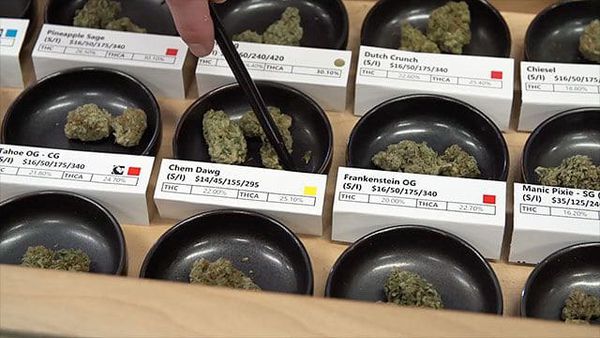Eye For Film >> Movies >> The Legend Of 420 (2017) Film Review
The Legend Of 420
Reviewed by: Jennie Kermode

In 1971, in San Rafael High School, California, 4:20pm was the time at which one had to be at the statue of Louis Pasteur if one wished to acquire cannabis. The phrase 420 made its way into popular culture as code for cannabis use, with associated celebrations taking place on the 20th of April each year, so there was some delight when the number came to be used for the California Senate Bill which confirmed the legality of medical use of the drug across the state. This was a turning point in America's attitude to a drug previously treated by authorities as beyond the pale. Now, as more and more states - and even other countries - look seriously at the option of legalising cannabis use, this documentary explores the commercial enterprises developing around it.
It has often been said that the real reason why cannabis is illegal is nothing to do with its intoxicating properties - it makes better medicine, better paper, better rope and, for many purposes, better cloth and better oil than most of what is on the market today. It's easy to grow even on poor land and processing it causes very little pollution. In other words, it's a commercial threat. The film explores some of these issues, with a particular focus on how cannabis might help to reduce environmental destruction and climate change, and looks briefly at the role of big business in fighting legalisation. It also looks at the gulf between public opinion and the number of senior politicians willing to consider the case for legalisation, but doesn't go into this area in depth. It doesn't consider serious medical concerns (e.g. those based around a link to schizophrenia) at all, though it does point out in other contexts the way the drug can be tailored to reduce certain properties and enhance others.

There is some consideration of historical allegations made against cannabis. Is it a gateway drug? The evidence doesn't support that, especially when it's removed from the context of petty crime. Is it addictive? Well, not really - at least in its traditional form - but simple observation of some of the users depicted here makes clear that it can be habit-forming. A healthy dose of humour ensures that the film doesn't become preachy. Several stand-up comedians share their observations. Legalisation is a real possibility, they say, if only people remember to vote. Meanwhile, artists explain how cannabis inspires them and makes them more creative, then treat us to a display of paintings which, whilst technically impressive, seem to have changed not one jot in style since the Sixties. Musical tributes to the drug, which form most of the film's soundtrack, exhibit the same tendency. Nonetheless, it's undeniable that there's a market for this stuff - among other users.
If you intend to consume cannabis when watching this film, beware - you will need to stock up on munchies. Acknowledging the drug's legendary status as an appetite stimulant, the film is littered with depictions of delicious-looking snacks. These include commercially produced food containing cannabis, each individually laser-etched to comply with standards, so buyers can see exactly what they contain.
Producing cannabis commercially isn't like growing it for home use. Business owners note that most of what they get offered simply isn't of a sufficiently high grade. Different strains are needed in different situations - for instance, a vet enthuses about its effectiveness as a painkiller for dogs, but notes that the version used is modified so it won't sap energy or induce a high. Very cute dogs bound and leap to illustrate this point. Fans of cute animal pictures on the internet will love it.
Cutesiness aside, the film is most interesting in its depiction of an economic shift of power centred around the drug, which has created a boom in small businesses that shows every sign of being sustainable. We don't meet representatives from the larger ones taking a hit, but it's obvious they're out there. "You don't just walk up to the aspirin bush and pick an aspirin," says one comic; he's presumably unaware of willow trees but his wider point is sound. When cannabis makes a great painkiller and anti-depressant, why pay for expensive pharmaceuticals?
This is a film likely to become more interesting over time as the balance of power between businesses shifts further and eventually settles. It's indulgent in places but has a lot of sound things to say, and will be of interest far beyond cannabis-using communities themselves.
Reviewed on: 03 Oct 2017















